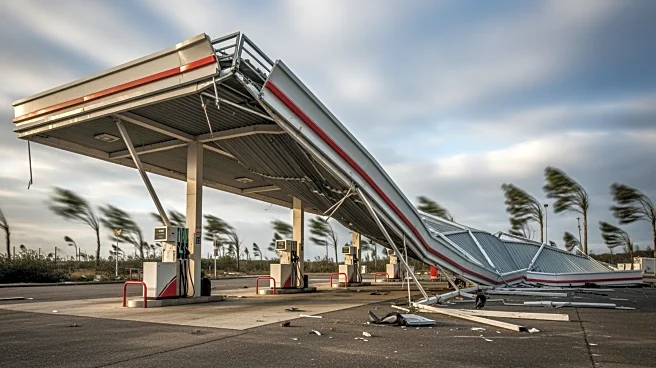What's Happening?
Ikea has reported a significant decline in profits for the fiscal year 2025, largely due to the impact of U.S. tariffs and efforts to maintain affordability. The company's total operating income fell to 1.7 billion euros, a decrease of over 25% from the previous
year's 2.3 billion euros. Net profit also dropped by nearly a third, from 2.2 billion euros to 1.5 billion euros. Despite these challenges, Ikea's sales volumes grew by 2.6%, and store visits increased by nearly 2%, reaching 915 million. The company opened 66 new locations globally, including full-size stores and smaller formats. Ikea plans to continue keeping prices accessible for its franchisees and customers, aiming for moderate growth in fiscal 2026.
Why It's Important?
The decline in Ikea's profits highlights the broader impact of U.S. tariffs on international businesses, particularly those reliant on commodity markets. Ikea's strategy to maintain affordability despite financial setbacks is crucial for sustaining customer loyalty and market share. The company's ability to grow sales volumes and expand its global presence despite profit declines demonstrates resilience and adaptability. This situation underscores the challenges faced by multinational corporations in navigating trade policies and economic fluctuations, which can significantly affect their financial performance and strategic decisions.
What's Next?
Ikea plans to maintain its current level of wholesale prices to ensure stability within its franchise system and affordability for customers. The company anticipates moderate growth in revenues and volumes for fiscal 2026, with expectations to remain profitable. As Ikea continues to expand its global footprint, it will likely focus on balancing cost management with strategic growth initiatives. Stakeholders, including franchisees and customers, will be closely monitoring Ikea's ability to adapt to ongoing economic challenges and maintain its competitive edge in the home goods market.
Beyond the Headlines
The situation with Ikea reflects broader economic trends where companies must navigate complex trade environments and fluctuating commodity prices. The company's commitment to affordability amidst profit declines raises questions about long-term sustainability and the potential need for strategic shifts. Additionally, Ikea's expansion efforts may influence global retail dynamics, as it sets a precedent for balancing growth with economic pressures. The ethical considerations of maintaining low prices while ensuring fair trade practices and supplier relationships are also noteworthy.
















